City Departments Advance Sustainability
City Departments Advance Sustainability
In the past year, multiple Departments have contributed to our City’s sustainability efforts, thanks to the City’s internal Climate Action Fund. Nicknamed the “Sustainability Fund,” it supports Departments across the City to accelerate Climate Action Work Plan goals and strategies. In the past two years, the funds have provided matching dollars for projects and purchases, spurring immediate, short-term actions that support our sustainability goals. The Fund supports implementation of the City’s Climate Action Work Plan, created in response to the City Council’s Climate Emergency Declaration (21-0256R), along with Energy and Conservation strategies identified in the Imagine Duluth 2035 Comprehensive Plan, and the Mayor’s goals to reduce greenhouse gas emissions.
The Sustainability Fund is open to a variety of projects across all City departments. Project proposals are accepted on an ongoing basis and are evaluated based on their contribution to sustainability in social, economic, and environment sectors. Ultimately, the main objectives of the Sustainability Fund are to 1) drive down emissions from City operations, 2) strengthen community resilience, 3) eliminate institutional barriers and better enable climate actions, and 4) create financial and workforce plans to support accelerated climate action.
So far, the Sustainability Fund has provided nearly $800,000 towards projects that have leveraged over $5 million in sustainability initiatives. Projects have varied from capital equipment investments, to building energy efficiency, to natural resources protection, and much more. Read the stories below to learn about some of the key projects!
Greener Custodial Equipment
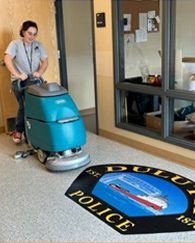 Staff in Property and Facilities Management (PFM) brought forward an idea for innovative custodial equipment that is not only more efficient and sustainable, but performs better overall and saves on staff time. The Sustainability Fund contributed $38,000 towards new floor cleaning and other custodial equipment. While some of these purchases may seem expensive upfront, the new equipment will pay for itself in the next one to four years through saving on custodial time, battery replacements, and chemical purchases, all while reducing the overall environmental impact of cleaning. The best part is the new equipment makes it easier to manage the 450,000 square feet of City buildings underneath the PFM’s responsibility.
Staff in Property and Facilities Management (PFM) brought forward an idea for innovative custodial equipment that is not only more efficient and sustainable, but performs better overall and saves on staff time. The Sustainability Fund contributed $38,000 towards new floor cleaning and other custodial equipment. While some of these purchases may seem expensive upfront, the new equipment will pay for itself in the next one to four years through saving on custodial time, battery replacements, and chemical purchases, all while reducing the overall environmental impact of cleaning. The best part is the new equipment makes it easier to manage the 450,000 square feet of City buildings underneath the PFM’s responsibility.
It is estimated that the new Tennant T2 walk-behind scrubber for Public Safety will save 65.5 labor minutes daily, saving thousands of dollars in labor hours each year. In terms of water and energy savings, the Numatic 244NX floor machines will save 1,315 gallons of water per year per unit for each of the three units ordered. These machines also come with lithium batteries, which are more energy-efficient than lead-based batteries and will last for 16 years, offsetting the 137 lead-based batteries that would have been used on the old equipment. The team plans to improve cleaning equipment for additional buildings in 2024, with matching dollars from the Sustainability Fund, so stay tuned for updates!
E-bikes for Police Department
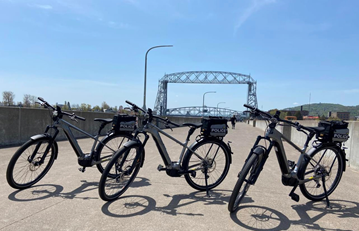 The Duluth Police Department welcomed the addition of 6 new electric bikes (e-Bikes) to their fleet, allowing for easier and more sustainable travel around the City. The Sustainability Fund financed $12,000 towards a project that included the purchase of pedal-assist Cannondale Tesoro bikes to be utilized by DPD’s Bike Patrol Unit. The e-Bikes provide multiple advantages to the department including better engagement with the community, off-road emergency response, assistance summiting Duluth’s infamous hills, and of course, lower carbon emissions. This benefit is in accordance with the City of Duluth Climate Action Plan’s goal of reducing emissions from City fleet vehicles and employee commutes.
The Duluth Police Department welcomed the addition of 6 new electric bikes (e-Bikes) to their fleet, allowing for easier and more sustainable travel around the City. The Sustainability Fund financed $12,000 towards a project that included the purchase of pedal-assist Cannondale Tesoro bikes to be utilized by DPD’s Bike Patrol Unit. The e-Bikes provide multiple advantages to the department including better engagement with the community, off-road emergency response, assistance summiting Duluth’s infamous hills, and of course, lower carbon emissions. This benefit is in accordance with the City of Duluth Climate Action Plan’s goal of reducing emissions from City fleet vehicles and employee commutes.
In 2022, the City’s Vehicle Fleet accounted for 25% of total Municipal emissions. Thus, EVs and e-Bikes are an especially effective way that the Police Department can contribute to sustainability goals, due to the amount of time spent in vehicles while on patrol. These new e-Bikes will reduce the amount of time spent in cars and increase accessibility in Duluth’s parks and trail systems. Within the first season of use, bike policing increased by 34%. The Police Department is looking forward to continuing their sustainability efforts while increasing efficiency and public safety.
Electric Vehicles and Charging Stations
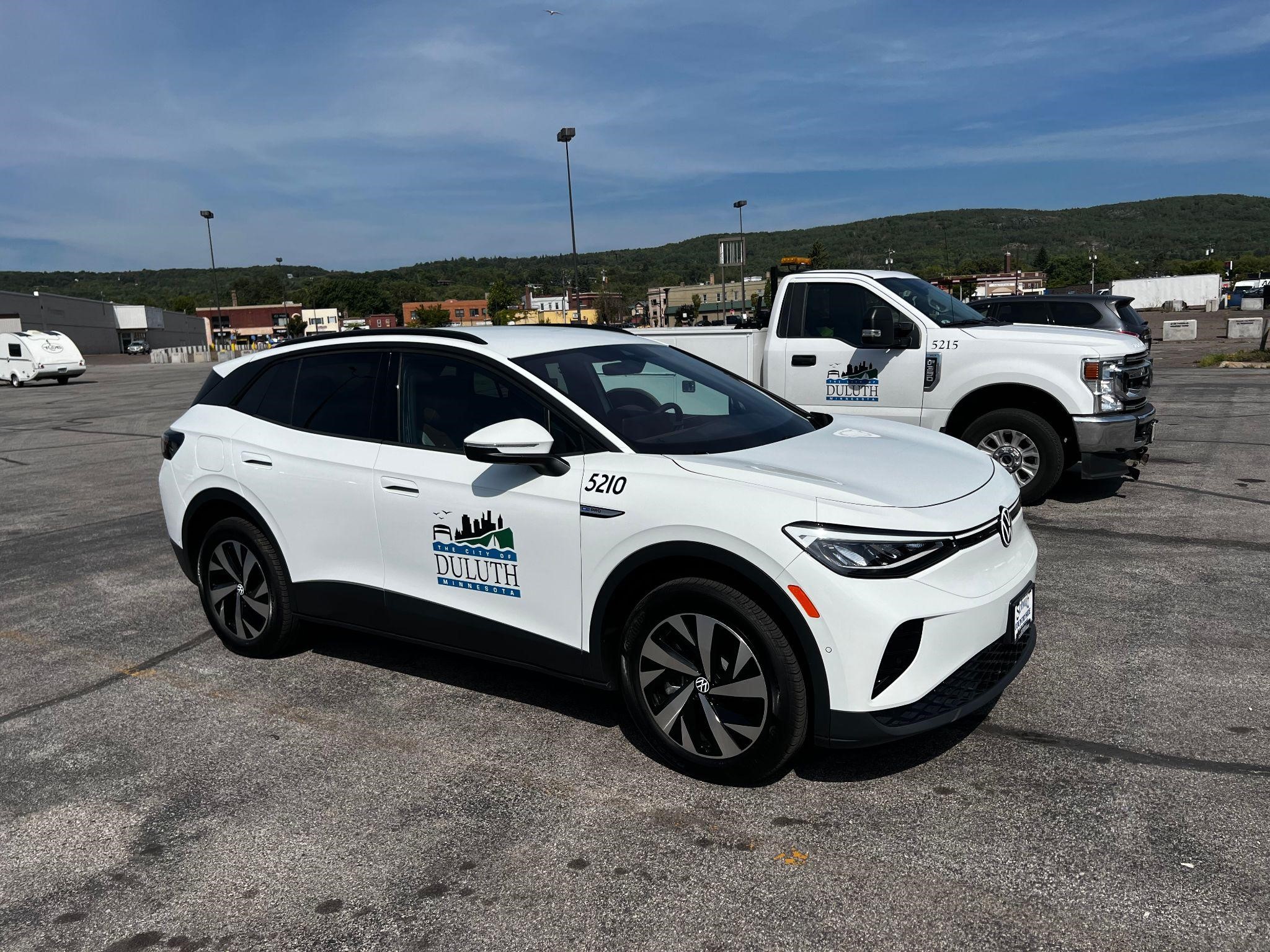 Efforts to reduce municipal carbon emissions continue with the City’s purchase of its first electric fleet vehicles. The Sustainability Fund provided $110,000 towards the $250,000 total purchase price of five electric vehicles (EVs) for three Departments. The Duluth Public Library purchased a plug-in hybrid electric vehicle (PHEV), as they needed a minivan and wanted to go green. The first fully-electric EV was purchased for Property and Facilities Management, and three more EVs were purchased for Life Safety inspectors.
Efforts to reduce municipal carbon emissions continue with the City’s purchase of its first electric fleet vehicles. The Sustainability Fund provided $110,000 towards the $250,000 total purchase price of five electric vehicles (EVs) for three Departments. The Duluth Public Library purchased a plug-in hybrid electric vehicle (PHEV), as they needed a minivan and wanted to go green. The first fully-electric EV was purchased for Property and Facilities Management, and three more EVs were purchased for Life Safety inspectors.
Because the City plans vehicle purchases about three years in advance, many Departments have funding available only for traditional gasoline vehicles. However, the Sustainability funding was able to fill the gap for the added costs of EV/PHEVs. These are just the first of many electric vehicles joining the City’s fleet, as initiatives to reduce emissions and reliance on fossil fuels are continued.
One of the biggest challenges to EV’s is the lack of charging infrastructure available, but the City is working to overcome this barrier with the addition of charging stations at various locations throughout the City. The timing isn’t always perfect, but staff have been incredibly patient and hard-working to deploy EVs. The Sustainability Fund also contributed $44,000 towards the purchase and installation of several charging stations at City Hall, Fire Hall #1, and Property and Facilities Management, along with renewing several public charging stations in Canal Park. Charging infrastructure is an important step in helping smooth the transition for additional electric vehicles in the future too.
Green Infrastructure for Parks
 The City of Duluth’s renovation of the historic Lincoln Park was an important project for the neighborhood, and for the Parks Department. To support the efforts to include green infrastructure for stormwater management, the Sustainability Fund contributed $300,000 towards the $4.2 million project. The green infrastructure includes six biofiltration basins, two drainage swells and a pollinator hillside. The finished project better connects and treats the stormwater that flows into the park from City streets and infrastructure above.
The City of Duluth’s renovation of the historic Lincoln Park was an important project for the neighborhood, and for the Parks Department. To support the efforts to include green infrastructure for stormwater management, the Sustainability Fund contributed $300,000 towards the $4.2 million project. The green infrastructure includes six biofiltration basins, two drainage swells and a pollinator hillside. The finished project better connects and treats the stormwater that flows into the park from City streets and infrastructure above.
In addition to the sustainable stormwater management pieces, a playground, interpretive signage, and restrooms were also added. Energy efficient lighting was incorporated throughout for improved safety. Accessibility was another design priority with the two bathrooms and trail system being made handicap accessible and the playground redesigned to become the first fully accessible playground in the City.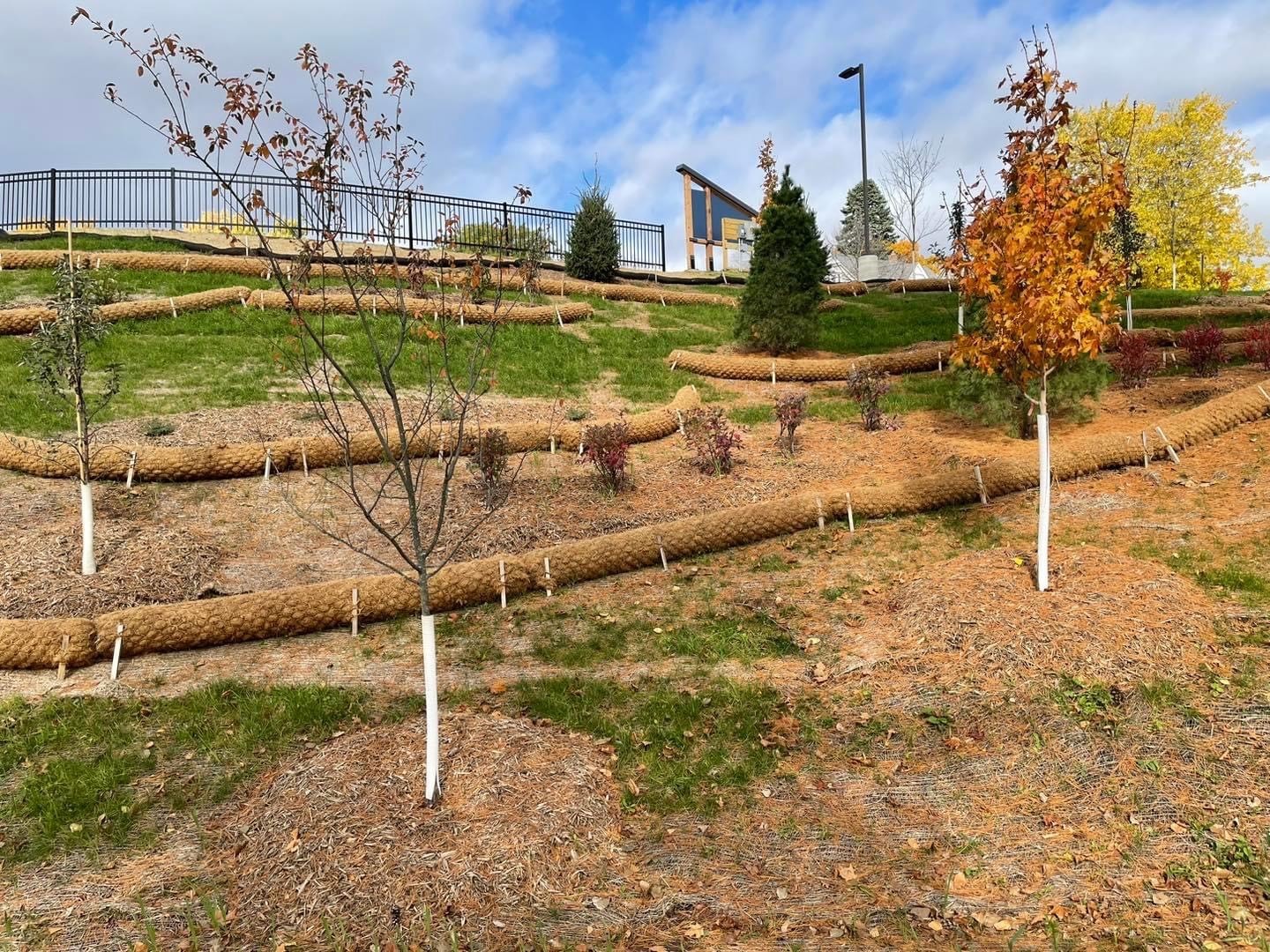
Lincoln Park is one of the two original parks in Duluth with many historical features. The historical pavilion, bridges and retaining walls were renovated and preserved in order to serve the community far into the future. Existing materials were reused throughout the park to reduce waste, retain the historical elements, and contribute to the sustainability of the project as a whole.
Street Sweepers
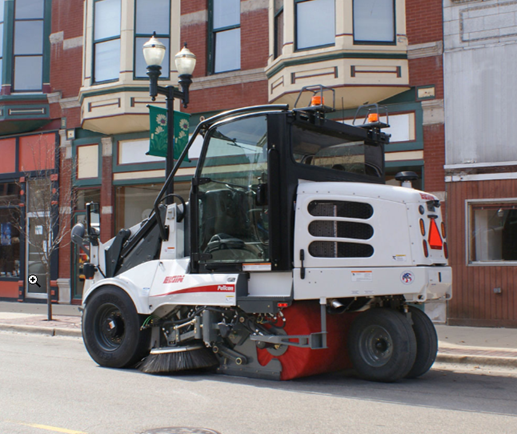 Efforts to better manage stormwater continue with Street Maintenance receiving two new pieces of equipment that will help their fleet to better protect Duluth streams and Lake Superior. With the help of the Sustainability Fund, two brand new Elgin Pelican Street Sweepers were added to the fleet to help capture left-over debris from the fall and winter seasons.
Efforts to better manage stormwater continue with Street Maintenance receiving two new pieces of equipment that will help their fleet to better protect Duluth streams and Lake Superior. With the help of the Sustainability Fund, two brand new Elgin Pelican Street Sweepers were added to the fleet to help capture left-over debris from the fall and winter seasons.
The sweepers were a welcome addition to the aging fleet as these units will help sustain the City’s street-sweeping operations. Staff in Street Maintenance appreciate not just the reliability and efficiency of the new equipment, but also features like adjustable broom camber and in-cab screens to reduce accidents. The project cost was $290,000, with $100,000 being supported from the Sustainability Fund. The new sweepers reduce fuel use and air pollution while protecting our streams and the Lake, along with providing reliable, better-functioning equipment to take care of our streets: a win-win!
Fire Department Electrifying Equipment
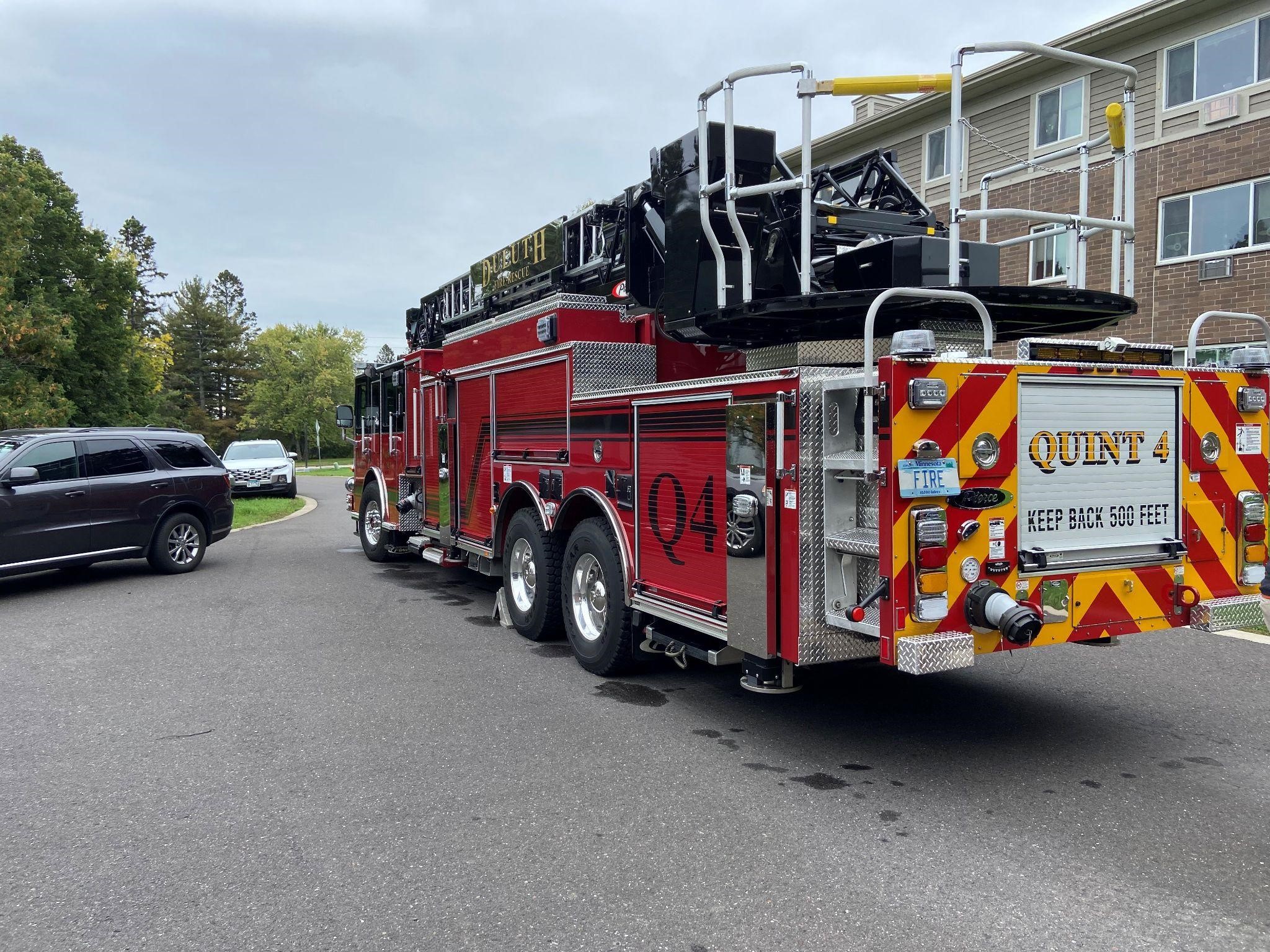 The City of Duluth's Fire Department received a new hybrid fire truck with both safety and sustainability features in mind. The new Quint 4 has non-idling technology and a feature that alerts motorists when it’s near. The new vehicle is not only safer for the community but better for the environment. When the current vehicles arrive at a scene, they are often left idling for long periods of time. With this new non-idling technology, the vehicle will power equipment for up to two hours at the scene while reducing its emissions. The vehicle is also much lighter than the older models which will reduce the wear and tear on roads. The Sustainability Fund contributed $18,000 towards the $580,000 rig, covering the additional cost of the hybrid function.
The City of Duluth's Fire Department received a new hybrid fire truck with both safety and sustainability features in mind. The new Quint 4 has non-idling technology and a feature that alerts motorists when it’s near. The new vehicle is not only safer for the community but better for the environment. When the current vehicles arrive at a scene, they are often left idling for long periods of time. With this new non-idling technology, the vehicle will power equipment for up to two hours at the scene while reducing its emissions. The vehicle is also much lighter than the older models which will reduce the wear and tear on roads. The Sustainability Fund contributed $18,000 towards the $580,000 rig, covering the additional cost of the hybrid function.
Along with the upgraded truck, the Fire Department also received funding towards some safer and more sustainable electric equipment. The Sustainability Fund contributed $45,000 towards $90,000 worth of new electric extrication equipment which can even be charged on the new vehicle. The new extrication equipment is lighter and safer for the team to use, significantly increasing efficiency while reducing emissions and simplifying equipment transport.
Finally, the Sustainability Fund contributed $26,000 to purchase E-bikes for the Department, for trail rescue support and non-emergency transportation too. The Fire Department is hopeful to continue upgrading their fleet and cutting their costs in the future, with the goal of safety and sustainability in mind.
Invasive Species Management
Duluth’s Parks Maintenance Forestry department is working hard to combat invasive species throughout the City. The Sustainability Fund contributed $39,000 in matching funds to leverage a $150,000 grant project to remove ash trees in response to the Emerald Ash Borer invasion. This project was led by our City Forester, who is responsible for the management of 20,000 trees that comprise Duluth’s urban forest.
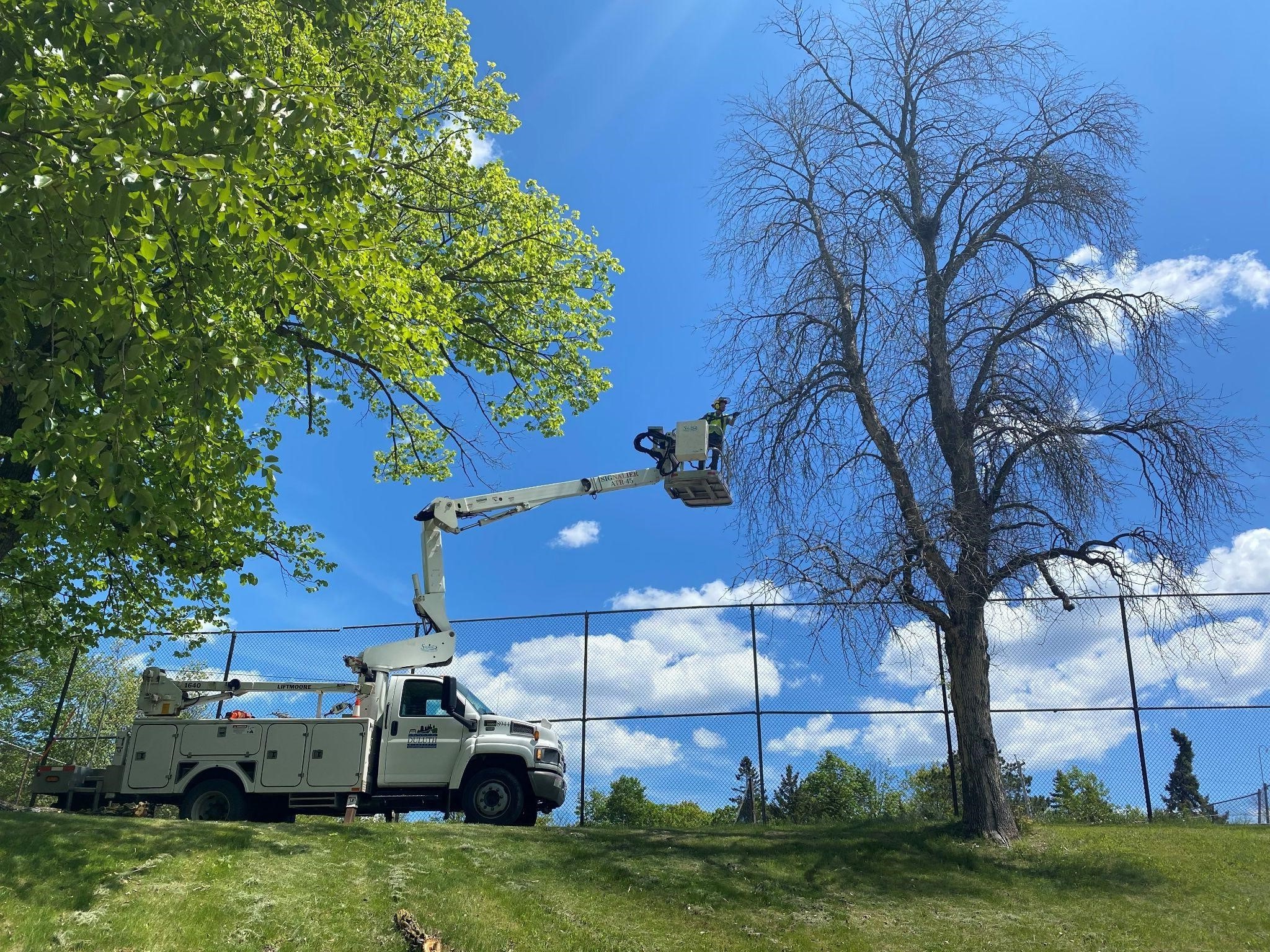 Another project proposed by the City Forester was to test and evaluate a variety of hedge materials to replace invasive shrub species such as Buckthorn and Japanese Honeysuckle. When left unchecked, invasive species outcompete native species and contribute to dangerous visibility issues by blocking roadway sightlines. As part of the beginning phases of the project, 15-20 native species of differing shrub sizes have been ordered and are set to be planted at various locations throughout the City. Native species will be evaluated on their growth and survival rates to determine the best candidates to replace harmful invasives. This $3,000 pilot project was a low-risk way to explore options, and ultimately, we hope the lessons learned will help fight invasives at other parks and greenspaces across Duluth, by building a more resilient native plant community.
Another project proposed by the City Forester was to test and evaluate a variety of hedge materials to replace invasive shrub species such as Buckthorn and Japanese Honeysuckle. When left unchecked, invasive species outcompete native species and contribute to dangerous visibility issues by blocking roadway sightlines. As part of the beginning phases of the project, 15-20 native species of differing shrub sizes have been ordered and are set to be planted at various locations throughout the City. Native species will be evaluated on their growth and survival rates to determine the best candidates to replace harmful invasives. This $3,000 pilot project was a low-risk way to explore options, and ultimately, we hope the lessons learned will help fight invasives at other parks and greenspaces across Duluth, by building a more resilient native plant community.
Energy Efficiency and Strategic Facility Planning for City Buildings
With a fleet of City buildings that have multiple decades of deferred maintenance, it is often difficult for our Property and Facilities Management staff to prioritize: what comes first? The answer tends to reveal itself when individual building issues arise suddenly. In order to get upstream on this issue, $150,000 of the Sustainability Fund was provided to support facility strategic planning and utility tracking support. By analyzing the Energy Use Intensity and conducting some building modeling, it will help PFM make data-informed decisions that prioritize the best opportunities to save energy in our fleet of public buildings.
In summary, the Sustainability Fund has been used for a variety of innovative projects that advance the City’s goals of climate action and community resilience. By helping provide gap funding to pilot new technologies, the Fund is reducing risk for Departments to invest in sustainable equipment and environmental protection. New project applications are being accepted on a rolling basis to continue implementation of our Climate Action Work Plan and advance sustainable initiatives across City Departments in the future!




